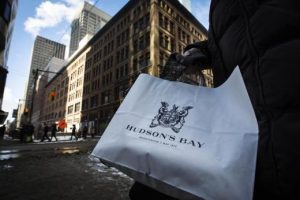Despite high retail sales, Hudson’s Bay Company reported a net loss of $125 million in the third quarter of 2016.
The Canadian-based retailer, which operates under many banners including Hudson’s Bay, Lord & Taylor, and Saks Fifth Avenue, reported a net loss of $125 million the third quarter of 2016 compared to net earnings of $7 million the year before. This represents an 1,886 per cent decrease in earnings, according to an analysis of its third quarter results.
“During the third quarter we continued to execute our all channel strategy in the face of a retail environment where there were challenges in the women’s apparel, department store and luxury segments,” said HBC’s governor and executive chairman officer Jerry Storch in a statement that accompanied the third quarter results. “To address this we are continuing to move aggressively, making specific improvements both in our digital and brick and mortar operations that will allow us to better serve our customers.”
According to the HBC’s statement, the primary reason for the net loss was the creation of joint ventures and the additional rent expenses associated with business acquisitions.
HBC has reported a business strategy based on growth through acquisitions. In May 2016, the retailer announced plans to expand to the Netherlands with up to 20 new stores over two years and in September, HBC announced long-term leases for 13 locations.
While reporting a net loss in earnings, HBC also reported retail sales of almost $9.86 billion in the first three quarters of 2016 compared to $6.68 billion the year before. This represents a 47.6 per cent increase.

Doug Stephens, business advisor and founder of Retail Prophet, said that in the face of higher sales, the factors that are playing into the operating loss are either higher operating costs or lower than expected gross profit margins.
“I would argue that HBC has rapidly trained their shoppers to expect to buy at a discount,” wrote Stephens in an emailed response. “Discounting sets off a viscous cycle where deeper and deeper discounts become necessary to hold market share, which of course results in lower profits and cuts into operating costs including staff.”
HBC also reported that while earnings were impacted by retail acquisitions, these same acquisitions increased retail sales.
HBC’s Stock Prices by atera on TradingView.com
According to Stephens, many in the industry believe that the recent acquisitions have less to do with buying retail businesses and more to do with buying real estate. Indeed, HBC has a real estate strategy.
“The Company has demonstrated a history of leveraging value from its substantial real estate holdings,” reported HBC in its report that accompanied the financial results. “The Company’s valuable real estate portfolio also serves to strengthen the Company’s balance sheet and operating business and provides the Company with increased financial flexibility.”
Stephens says that one-time costs associated with acquisitions could temporarily impact net earnings, but he doubts the strategy could work long term.
“Even as a retail strategy, acquisition can only work for them in the short term. At some point they will run short of acquisition opportunities and have to grow organically on a comparable store basis,” wrote Stephens.
On Friday, the Wall Street Journal reported that HBC and U.S. based company Macy’s have entered into preliminary deal talks. One deal option involves HBC taking over Macy’s real estate.
